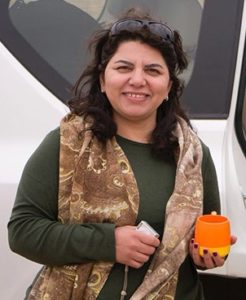March 15, 2019

Iran’s state news agency says authorities have extended a travel ban on the widow of an Iranian-Canadian environmentalist who died in prison last year after being arrested on suspicion of espionage.
The Islamic Republic News Agency (IRNA) quoted a lawyer for Maryam Mombeini as saying he had gone to a Tehran court February 17 to seek an end to the year-long ban imposed on the widow of the environmentalist, Kavous Seyed-Emami. Lawyer Payam Derafshan told IRNA a court official informed him the travel ban on Mombeini has been extended.
IRNA quoted Derafshan as saying he has now written a letter of complaint to the Tehran prosecutor, arguing the ban should not have been extended because Mombeini has fully cooperated with authorities investigating the spying allegations against her late husband and she was not a suspect in that case. The lawyer told IRNA he also reminded the prosecutor that Mombeini’s travel ban has deprived her from being with her two sons, who left Iran for Vancouver last March. Both are Canadian citizens.
There was no word from Iranian state media as to why Mombeini is still barred from leaving Iran.
Canadian Prime Minister Justin Trudeau called on Iran last March to let Mombeini be with her sons.
Iran detained Seyed-Emami and eight other members of the Persian Wildlife Heritage Foundation in January 2018, accusing them of using wildlife cameras to spy on military sites. Seyed-Emami died in custody the following month in what officials termed a suicide. Family members disputed that assertion and called for further investigation.
The Iranian Students News Agency (ISNA) said the conservationists appeared in a Tehran court February 18 for the fifth session of their trial, which began January 30. It said a prosecutor completed reading the more than 300-page indictment of the eight defendants—Niloufar Bayani, Taher Ghadirian, Houman Jowkar, Sepideh Kashani, Amir Hossein Khaleghi, Abdolreza Kouh-payeh, Sam Rajabi and Morad Tahbaz. The last is an Iranian-American dual citizen.
The New York-based Center for Human Rights in Iran (CHRI) has quoted a source as saying much of the indictment was based on forced confessions from Bayani. It cited the source as saying Bayani interrupted the trial’s opening session several times, accusing investigators of extracting confessions from her under mental and physical duress, and saying she has since retracted those statements.
CHRI quoted a source as saying Bayani was absent from the third, fourth and fifth sessions of the trial, although her court-appointed lawyer was present. CHRI said it did not know the reason for Bayani’s absence.
International human rights organizations have called on Iran to release the environmentalists and investigate allegations that authorities have mistreated them.
A group of 369 international conservation practitioners and scholars have added their names to a November 2018 open letter to the Supreme Leader, saying they believe all eight are innocent.























